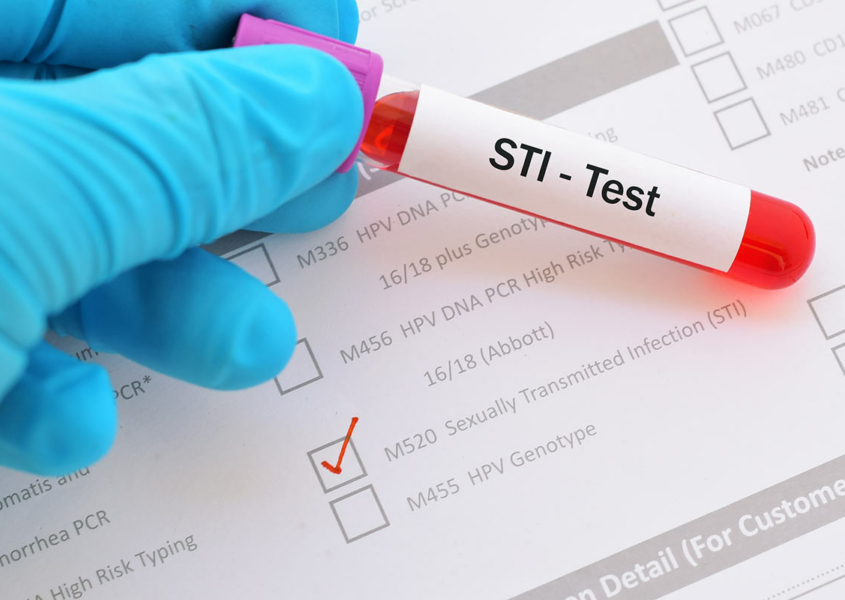Why STI Testing Should Be Part of Your Self-Care Routine
What Are STIs and Why Should You Get Tested?
STIs, or sexually transmitted infections, are infections passed between partners during sexual contact.
While “STDs” or “sexually transmitted diseases” used to be the common term, STI is now preferred because these infections can often be cured or managed with treatment.
As a sexually active woman, STI testing should be an important part of your self-care routine. Many STIs don’t show symptoms, so the only way to know if you have one is through testing. If detected and treated early, most STIs can be cured or managed well with antibiotics or antiviral medication. However, without treatment, STIs can lead to long-term health issues like infertility, cancer, liver disease, and even death.
You should get tested after every new partner, or at least once a year. Getting tested and encouraging your partners to get tested too shows you care about your health and the health of your community. Testing is often free or low-cost at clinics. Home test kits are also available, though less accurate.
The Most Common STIs: Symptoms, Testing, Treatments
The most common STIs are chlamydia, gonorrhea, herpes, HPV, syphilis, and trichomoniasis.
These infections are common, but the good news is that most are curable if caught early. At Madison Women’s Health, we recommend our patients get tested for chlamydia, HPV, gonorrhea, and trichomoniasis as part of their annual exam or Pap test.
Early detection of these infections is key to preventing long-term health issues.
Chlamydia
Chlamydia is a common STI that is caused by bacteria. It is often asymptomatic, meaning you may not notice any symptoms. If symptoms do appear, you may experience abnormal discharge from the vagina or penis, pain during urination or sex, and lower abdominal pain.
If left untreated, chlamydia can lead to pelvic inflammatory disease, which may cause permanent damage to your reproductive organs.
Chlamydia is diagnosed with a urine test or swab and cured with a round of antibiotics. To avoid reinfection, sexual partners should also be treated.
HPV
The human papillomavirus or HPV is an extremely common viral STI. There are over 100 strains of HPV, some of which are low-risk and cause genital warts, while high-risk strains may lead to cervical cancer in women. HPV often has no symptoms, so the only way to detect it is through routine Pap smears and HPV testing.
While there is no cure for HPV, the good news is most infections clear up on their own. However, certain high-risk HPV infections require close monitoring or procedures like colposcopy to check for precancerous cell changes.
Treatment for HPV warts includes freezing, laser therapy or topical creams.
The Gardasil vaccine protects against cancer-causing HPV strains. The CDC recommends all girls and boys get vaccinated by age 26. When administered to children, it is a two-vaccine series. The Gardasil vaccine is also available for men and women through age 45. A three-vaccine series is administered to adults.
Hepatitis C
Hepatitis C is a viral infection that causes inflammation of the liver. It is often asymptomatic for years but can eventually lead to serious liver damage if left untreated. Common symptoms include fatigue, nausea, muscle aches, and jaundice (yellowing of the skin).
Hepatitis C is most commonly spread through contact with contaminated blood, though it can also be transmitted sexually. Treatment typically involves antiviral medications to clear the infection, slow damage to the liver or, in some cases, even cure the infection.
Gonorrhea
Gonorrhea is a common bacterial STI that can affect both men and women. Symptoms in women include unusual discharge from the vagina, pain during sex or urination, and bleeding between periods. In men, symptoms include discharge from the penis, pain during urination or soreness in the testicles.
Gonorrhea can usually be cured with antibiotics, though treatment may require a longer course of medication if it has been present for some time. Without treatment, gonorrhea can lead to pelvic inflammatory disease, infertility and pregnancy complications.
Trichomoniasis
Trichomoniasis usually causes symptoms like itching, burning, redness or soreness in the genital area and an unpleasant-smelling discharge. Diagnosis and treatment are the same as for chlamydia and gonorrhea—trichomoniasis is tested using a genital swab or urine sample and treated with a prescription medication.
If left untreated, it may lead to pregnancy complications, so testing is especially important for pregnant women.
Syphilis
Syphilis is highly contagious. It is caused by a bacteria, which produces a painless sore on the genitals, rectum, or mouth. There has been an uptick in the number of cases of syphilis in the past decade. Syphilis is typically treated with penicillin.
HIV
HIV can cause major health problems and even death by weakening the body’s immune system. Traditionally, the only way to prevent transmission of HIV was to use condoms. Now, a medication is available to use prior to exposure to HIV: PrEP. PrEP stands for pre-exposure prophylaxis.
If your partner is HIV positive, a medication called Cabotegravir can help prevent you from getting HIV-1 through sex. It is administered either by injection or a daily pill. This medication must be taken as directed for it to be effective.
Prevention 101: Safe Sex and Vaccinations
Use Protection Every Time
Condoms are your best defense against STIs. Use them for any sexual contact—not just intercourse. Don’t rely on the pull-out method or any other method that doesn’t provide a physical barrier.
Get Tested Regularly
Many STIs don’t show symptoms, so the only way to know for sure if you have an STI is through testing. The CDC recommends getting tested at least once a year, or more often if you have multiple partners.
Tests for STIs include:
- Blood tests: Check for HIV, syphilis, and hepatitis.
- Urine tests: Screen for chlamydia and gonorrhea.
- Swab tests: A sample is taken from the cervix or urethra to test for chlamydia, gonorrhea, herpes, and HPV.
- Physical exams: Doctors check for signs of infections, genital warts, and discharge.
At-home tests are available for some STIs but may be less accurate than tests done by a doctor. See your doctor for the most reliable results. Testing is often free, confidential, and can provide peace of mind.
Consider Vaccination
Vaccines are available for some viral STIs, including HPV, hepatitis A, and hepatitis B. The HPV vaccine is recommended for all preteens at age 11-12, but can be given up to age 26. It protects against the HPV strains most likely to cause genital warts and cervical cancer. Hepatitis vaccines are also routinely given to infants but should be considered for at-risk adults.
Where to Get Tested for STIs in Madison
Getting into a regular habit of STI testing — especially if you have new or multiple sexual partners — is one of the best ways to take control of your reproductive and sexual health. There are several options for confidential and low-cost (or free) testing right here in Madison.
- Madison Women’s Health: As a women-owned clinic focused on caring for the community, Madison Women’s Health provides discreet STI testing for people of all genders. We offer screening for common infections like chlamydia, gonorrhea, herpes, HPV, syphilis, and HIV.
- First Care Clinic: First Care Clinic’s medical professionals can provide STI testing for women, free of charge.
- Public Health Madison & Dane County (PHMDC): For those without health insurance, PHMDC provides low-cost STI testing through their Sexual Health Clinic. They offer screening for chlamydia, gonorrhea, syphilis, herpes, and HIV, with results available during your visit or within a few business days. The clinic staff understands that anyone can be at risk for an STI, so they aim to provide judgment-free care for people of all backgrounds.
- At-home test kits: While convenient, at-home STI test kits may not be as accurate as testing done by a healthcare provider. Results can be difficult to interpret without professional guidance. However, for those unable or unwilling to visit a clinic, at-home tests do provide an option for screening. Look for test brands that analyze samples at a certified lab for the most reliable results. Be aware that at-home tests typically do not screen for all STIs. No test is 100% accurate, so follow-up testing at a clinic is recommended if you receive a positive result.
For the most reliable results, get a full STI screening that includes:
- A pelvic exam for women, which allows the doctor to check for any abnormalities.
- Urine, blood, and swab samples to test for chlamydia, gonorrhea, syphilis, herpes, HIV, and hepatitis B and C.
- A Pap smear to screen for HPV and cervical cancer. The latest HPV tests can detect 14 high-risk HPV strains.
- Additional testing for symptoms like genital sores, rashes, or discharge.
How to Bring Up STI Testing With Partners
Bringing up STI testing with a new partner can feel awkward, but it’s an important conversation to have. At Madison Women’s Health, we strongly advise all our patients to get tested regularly, especially for those who have multiple partners or are starting a new relationship.
The good news is, there are some tips to make this talk a little easier.
Frame it around health and caring for each other.
Let your partner know you want to make sure you’re both safe and healthy before becoming intimate. This approach feels more positive and less accusatory. You might say something like, “I care about you and our health, so I think we should both get tested for STIs before we have sex.”
Discuss getting tested together.
Offer to accompany your partner to get tested, and get tested yourself at the same time. This shows you’re in it together and can help put them at ease.
Be open and honest about your concerns.
Don’t be afraid to voice why STI testing is important to you, especially if you’ve had experiences with STIs in the past or a previous partner. However, be sensitive about how you frame it. Focus on the present and future, not on past relationships. Let your partner know you want to build trust and intimacy in a healthy way.
Talk about the specifics of what you want tested.
Discuss which STIs in particular concern you, based on your risks and experiences.
Discuss what you’ll do if there are positive results.
This is an important part of the conversation, even if it’s uncomfortable. Talk about the treatment options, the need to notify past partners, and using protection like condoms during treatment and recovery. Having a plan in place will make dealing with positive results much easier.
Do it with empathy, honesty and care for your partner and relationship.
Turn it into an opportunity to build trust and set a foundation of good health and open communication.
While it may feel awkward, the benefits to your peace of mind and intimacy will make this difficult conversation worth it.
Conclusion
Getting tested for STIs should absolutely be part of your regular self-care routine. Your sexual health and well-being deserve the same level of care and attention as your physical and mental health. While it can feel uncomfortable or embarrassing, STI testing is a critical way for you to take control of your health and your body.
Knowing your status gives you the power to make informed choices about safe sex practices and to get treatment right away if needed.
Make that appointment today—your future self will thank you!
 Dr. Dickmeyer has been providing healthcare for women in the Madison area since 1998 and is a founding member of Madison Women’s Health. Her specialties include minimally invasive surgical techniques, high and low risk obstetrics, pelvic floor disorders and postmenopausal medicine.
Dr. Dickmeyer has been providing healthcare for women in the Madison area since 1998 and is a founding member of Madison Women’s Health. Her specialties include minimally invasive surgical techniques, high and low risk obstetrics, pelvic floor disorders and postmenopausal medicine.









